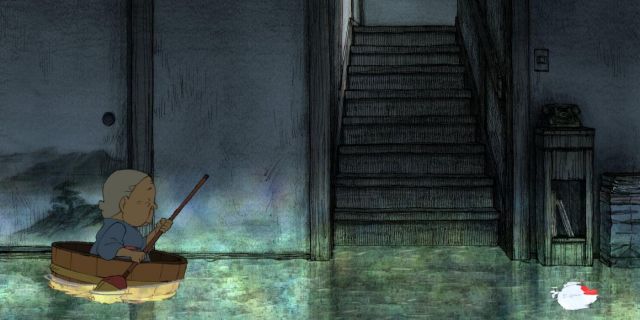A Grandma’s Goldfish, directed by Kaori Iwase, was produced at the Tokyo University of the Arts and released in October 2012. The 8-minute short went on to win Film Award at the 24th annual CG Anime Contest (2012) and the Tokyo Anime Award (2013). Iwase’s inaugural project follows an old lady and her beloved pet goldfish, Tama-chan, both in the real world and in a series of dreams. The ONA reflects upon old age and the instability of memories.
Throughout the short, water is used to highlight how easily thoughts are diverted, displaced and changeable, particularly as one gets older. The protagonist, who suffers from dementia, goes on a journey of self-discovery where she recaptures moments from her childhood and uncovers the reason why she has a love of goldfish.
The Plot of A Grandma’s Goldfish

Viewers are introduced to an old lady who lives in a rural area of Japan and is being looked after by her granddaughter. Despite her age, the woman acts in a childlike manner and is guided by her relative to stop playing with her collection of fish and go to bed. As night falls, her favorite pet, Tama-chan, manages to escape its tank as it begins to overflow. Startled by the noise, the old lady wakes up to discover a stream running through her family house. Without hesitation, she pulls out a wooden tub, which she uses to float downstream to find her fish.
As the woman is carried by the current, she wanders through a seemingly endless series of corridors until she enters a vast opening. In an effort to save Tama-chan, the old lady plunges into the murky depths and is shortly transported to a scene from her childhood. Here, she is reminded of her first encounter with a goldfish, which sadly dies after the water that it’s contained within spills onto the ground. As her mother begins to console her former self, the now-old woman wakes up and finds herself lying next to Tama-chan’s tank, which has been left undisturbed.
Dementia, Water and Memories

A Grandma’s Goldfish attempts to unravel memory and the importance that it has in a person’s daily life. The short’s protagonist clearly has a love for goldfish, water and the element of discovery that can come from play. However, she is unable to recall or understand where her excitement for these things stems from, which keeps her in a state of child-like innocence and ignorance. The stream of water and the plethora of corridors that she ventures down are used as symbols to represent her mind and the memories that it holds.
Like water, the woman’s memories are in a constant state of flow, unstable and easily displaced. While a person can hold water in their hands, it’s not long before it begins to seep away and rejoin its pool of origin. As the protagonist has grown older, her memories have progressively faded away and prevented her from perceiving reality in the same way as her youth. Without a concrete conception of the past, she too remains trapped in the present and unable to envisage her future.
Although the childhood moment that she manages to recapture is a painful one, in which she encounters death for the very first time, it’s also one of joy, as she has finally understood a part of herself. The old lady has rediscovered her mother and where her love of goldfish comes from, and she even recognizes the inevitability of her fate.
Kaori Iwase’s A Grandma’s Goldfish’s beautiful hand-drawn animation style and soothing score are a joy to behold. While the short’s dialogue is sparse and its narrative simple, Iwase has managed to imbue the work with a considerable degree of emotion that will keep viewers gripped. Like the protagonist, those watching this ONA are encouraged to reflect on their own past and the things they hold dear, carefully considering the memories they hold.















Leave a Reply